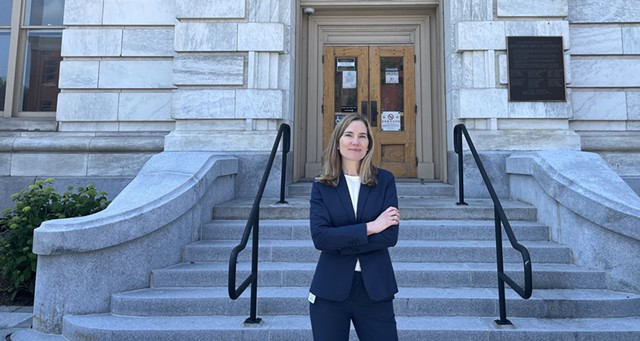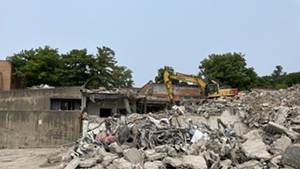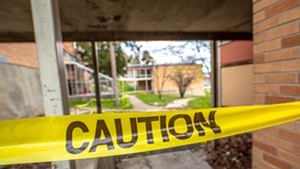
- Katie Futterman ©️ Seven Days
- Attorney General Charity Clark outside a Burlington courthouse
Vermont has sued PCB manufacturer Monsanto, claiming that its chemicals have fouled its environment and many of its schools, Attorney General Charity Clark announced on Monday.
The lawsuit, filed on Friday in Vermont Superior Court in Burlington, comes as older Vermont schools are testing their campuses for PCB contamination. Many communities are facing potentially expensive remediation projects.
Burlington, for instance, opted to demolish its old high school because of airborne PCBs that were in materials used to construct the school. A new $190 million school is planned on the same site off North Avenue. (Burlington’s school district has separately sued Monsanto.)
In 2021, the Vermont legislature passed Act 74, which requires all schools built or renovated before 1980 to test their indoor air for PCBs. To date, nearly 50 schools have been tested, and at least 13 have levels that are concerning. It’s too early to say how many schools will have problems that need to be corrected or what it might cost.
Vermont is also alleging that PCBs have contaminated its waters, forcing the state to issue fish-consumption advisories for Lake Champlain and the Hoosic River. It further lists dozens of other sites around Vermont where PCBs have been detected.
Vermont claims that Monsanto knew its products were hazardous. It cites a document in which the company in 1955 warned its employees not to eat lunch in an area where the chemicals were made. And a Monsanto manager called PCBs an “uncontrollable pollutant,” the suit says.
Vermont alleges that Monsanto knew that the normal use of PCBs would lead to widespread contamination. “Old Monsanto’s internal documents show that the company deliberately decided to keep selling PCB mixtures despite the company’s awareness of the potential for mass contamination, which they inevitably caused,” the suit says.
When asked to comment, representatives from Monsanto sent a statement which read, in part, “Monsanto never manufactured, used or disposed of PCBs in Vermont and has not manufactured these products for more than 45 years. The PCB-containing products that are alleged to be the source of any impairment claims were produced by third party companies, not Monsanto.
"There is no basis in law to impose liability for trespass, nuisance or failure to warn claims on a company that legally manufactured a product, last put them into the stream of commerce over 45 years ago, and had no control over these components once they were sold to sophisticated, industrial manufacturers for use in their finished products.”
Monsanto "was responsible for the manufacture" of 99 percent or more of all PCBs used within the United States between 1929 and 1977, the suit says. The chemicals were sold for use in paints, caulks, inks, dyes, paper products, lubricants, sealants, plasticizers, coolants, hydraulic fluids, fireproofing, and industrial electrical equipment such as capacitors and transformers.
PCBs are synthetic manmade chemicals made to mimic a fatty lubricant. They have been linked to health effects related to thyroid, liver, immune system and reproductive issues and links to cancer.
In 2022, New Hampshire reached a $22 million settlement with the company regarding PCB contamination of state waterways and other state-owned property. Also last year, Ohio reached a $80 million settlement with Monsanto, and Oregon’s attorney general settled with the company for nearly $700 million.
Monsanto was also ordered in 2021 and 2022 to pay out hundreds of millions of dollars in lawsuits filed by Washington State students, parents and teachers, who said that PCBs on the campus of Sky Valley Education Center led to neurological problems, skin lesions, cancer and other illnesses.
Two educators at Burlington High School filed a similar lawsuit against Monsanto last October, alleging that workplace exposure to the chemicals led to reproductive, metabolic and cognitive issues. That case is pending.
The lawsuit, filed on Friday in Vermont Superior Court in Burlington, comes as older Vermont schools are testing their campuses for PCB contamination. Many communities are facing potentially expensive remediation projects.
Burlington, for instance, opted to demolish its old high school because of airborne PCBs that were in materials used to construct the school. A new $190 million school is planned on the same site off North Avenue. (Burlington’s school district has separately sued Monsanto.)
In 2021, the Vermont legislature passed Act 74, which requires all schools built or renovated before 1980 to test their indoor air for PCBs. To date, nearly 50 schools have been tested, and at least 13 have levels that are concerning. It’s too early to say how many schools will have problems that need to be corrected or what it might cost.
Vermont is also alleging that PCBs have contaminated its waters, forcing the state to issue fish-consumption advisories for Lake Champlain and the Hoosic River. It further lists dozens of other sites around Vermont where PCBs have been detected.
Vermont claims that Monsanto knew its products were hazardous. It cites a document in which the company in 1955 warned its employees not to eat lunch in an area where the chemicals were made. And a Monsanto manager called PCBs an “uncontrollable pollutant,” the suit says.
Vermont alleges that Monsanto knew that the normal use of PCBs would lead to widespread contamination. “Old Monsanto’s internal documents show that the company deliberately decided to keep selling PCB mixtures despite the company’s awareness of the potential for mass contamination, which they inevitably caused,” the suit says.
When asked to comment, representatives from Monsanto sent a statement which read, in part, “Monsanto never manufactured, used or disposed of PCBs in Vermont and has not manufactured these products for more than 45 years. The PCB-containing products that are alleged to be the source of any impairment claims were produced by third party companies, not Monsanto.
"There is no basis in law to impose liability for trespass, nuisance or failure to warn claims on a company that legally manufactured a product, last put them into the stream of commerce over 45 years ago, and had no control over these components once they were sold to sophisticated, industrial manufacturers for use in their finished products.”
Monsanto "was responsible for the manufacture" of 99 percent or more of all PCBs used within the United States between 1929 and 1977, the suit says. The chemicals were sold for use in paints, caulks, inks, dyes, paper products, lubricants, sealants, plasticizers, coolants, hydraulic fluids, fireproofing, and industrial electrical equipment such as capacitors and transformers.
PCBs are synthetic manmade chemicals made to mimic a fatty lubricant. They have been linked to health effects related to thyroid, liver, immune system and reproductive issues and links to cancer.
In 2022, New Hampshire reached a $22 million settlement with the company regarding PCB contamination of state waterways and other state-owned property. Also last year, Ohio reached a $80 million settlement with Monsanto, and Oregon’s attorney general settled with the company for nearly $700 million.
Monsanto was also ordered in 2021 and 2022 to pay out hundreds of millions of dollars in lawsuits filed by Washington State students, parents and teachers, who said that PCBs on the campus of Sky Valley Education Center led to neurological problems, skin lesions, cancer and other illnesses.
Two educators at Burlington High School filed a similar lawsuit against Monsanto last October, alleging that workplace exposure to the chemicals led to reproductive, metabolic and cognitive issues. That case is pending.









Comments
Comments are closed.
From 2014-2020, Seven Days allowed readers to comment on all stories posted on our website. While we've appreciated the suggestions and insights, right now Seven Days is prioritizing our core mission — producing high-quality, responsible local journalism — over moderating online debates between readers.
To criticize, correct or praise our reporting, please send us a letter to the editor or send us a tip. We’ll check it out and report the results.
Online comments may return when we have better tech tools for managing them. Thanks for reading.